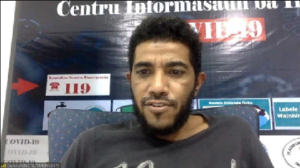 *According to UNESCO, “One year into the COVID-19 pandemic, close to half the world’s students are still affected by partial or full school closures, and over 100 million additional children will fall below the minimum proficiency level in reading as a result of the health crisis.”
*According to UNESCO, “One year into the COVID-19 pandemic, close to half the world’s students are still affected by partial or full school closures, and over 100 million additional children will fall below the minimum proficiency level in reading as a result of the health crisis.”
Looking for the solution of these crises, on June 12, 2021, ‘The 3rd Youth Empowerment Peace Workshop (YEPW)’ was held online and attended by 35 youths of youth organizations from seven countries, including Cameroon, South Sudan and East Timor.
Focusing on the ‘what kind of non-formal education is needed at each community level’, part 1 was composed of the discussion on Non-formal education of the NGO and part 2 was composed of introduction to HWPL Peace Education and a presentation on the need for peace education. HWPL’s peace education has a specific curriculum that can teach harmony and peace between individuals, communities, nature, people and generations, and aims to foster peace citizens and make peace sustainable.
In the first and second YEPW, opinions that peace education should be preceded by equal quality education, and non-regular education is needed to solve the global shortage of educational infrastructure was gathered from the participants.
Daniel Santos do Carmo, Executive Director of FONGTIL, who was in charge of presenting the education system for youth in community, explained the current education system in Timor-Leste and highlighted NGOs role to make revitalize youth education. He said “
He said “The Ministry of education has renovated and repaired many schools which were destroyed in 1999. Further-more MOE has continued to provide and improve training programs for teachers, and establishing a standardized curriculum relevant to East Timorese students. Despite such efforts, in number of challenges still remain including training of teachers and lack of proper facilities, etc.

For development of the country, the government should invest the better education system and education infrastructures, and NGOs should be interested in and move on the advocacy for quality education which can be done through policy changes.”
YEPW is a global peace discussion platform where youth from 111 countries around the world who work with IPYG participates. For solving the problems that community and youths facing, IPYG is conducting workshops to find, discuss in each continent with youth in each country. This could be one of the ways to achieve the fourth goal of the UN-SDGs (Sustainable Development Goals), quality education and implement the spread of peace culture in Article 10 of the DPCW.














